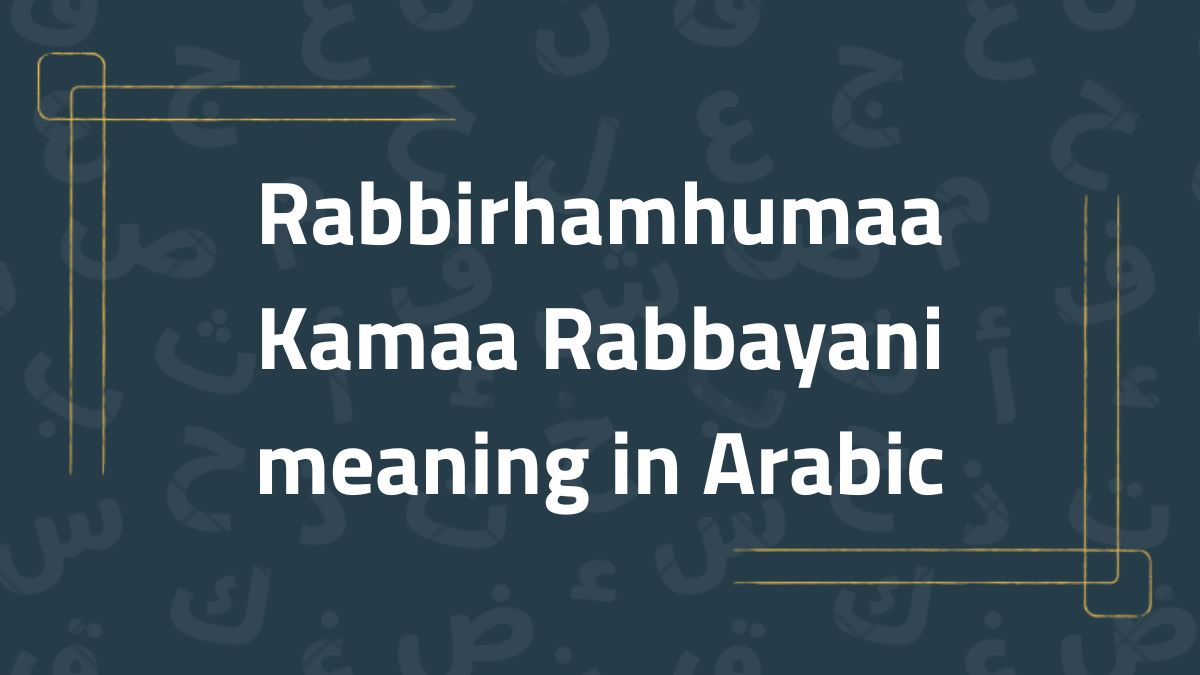The Word "Rabbirhamhumaa Kamaa Rabbayani" Meaning in Arabic

The phrase “رَبِّ ارْحَمْهُمَا كَمَا رَبَّيَانِي صَغِيرًا” (Rabbirhamhumaa kamaa rabbayani sagheera) is a well-known Arabic supplication. It holds deep religious significance, especially in Islamic teachings. This article explains its meaning, linguistic roots, Quranic relevance, and usage in daily life.
The Meaning of “Rabbirhamhumaa Kamaa Rabbayani” in Arabic
The phrase translates to:
“My Lord, have mercy upon them as they brought me up when I was small.”
-
رَبِّ (Rabbi): “My Lord”
-
ارْحَمْهُمَا (irhamhumaa): “Have mercy on them” (referring to parents)
-
كَمَا (kamaa): “Just as”
-
رَبَّيَانِي (rabbayani): “They raised me”
-
صَغِيرًا (sagheera): “When I was young”
This prayer is often recited by children for their parents, asking Allah to bless them in return for their care.
Linguistic Root and Grammatical Usage
The phrase comes from classical Arabic and includes key root words:
-
ر-ح-م (R-H-M): Linked to mercy (e.g., رحمة – rahma)
-
ر-ب-ب (R-B-B): Related to nurturing or upbringing (e.g., ربّ – Rabb – Lord)
Grammatically:
-
ارْحَمْهُمَا (irhamhumaa): A command form (dua) addressing Allah.
-
رَبَّيَانِي (rabbayani): Past tense verb meaning “they raised me.”
Examples of “Rabbirhamhumaa Kamaa Rabbayani” in Arabic Sentences
-
يَدْعُو المُسْلِمُ بِـ “رَبِّ ارْحَمْهُمَا كَمَا رَبَّيَانِي صَغِيرًا” لِوَالِدَيْهِ.
“A Muslim prays, ‘My Lord, have mercy on them as they raised me when I was young,’ for his parents.” -
هَذَا الدُعَاءُ يَجْمَعُ بَيْنَ الشُّكْرِ وَالرَّحْمَةِ.
“This prayer combines gratitude and mercy.”
Cultural or Quranic Significance of “Rabbirhamhumaa Kamaa Rabbayani”
This phrase reflects Quranic teachings on honoring parents. While the exact words are not a Quranic verse, the meaning aligns with:
-
Surah Al-Isra (17:24): “And lower to them the wing of humility out of mercy and say, ‘My Lord, have mercy upon them as they brought me up when I was small.'”
Muslims use this dua to seek blessings for their parents, especially after their passing.
Common Misunderstandings or Mistakes
-
Some confuse رَبَّيَانِي (rabbayani) with رَبِّي (Rabbi – My Lord).
-
The phrase is often mispronounced; the correct form is “Rabbirhamhumaa” (not “Rabbi irhamhumaa”).
Why You Should Learn “Rabbirhamhumaa Kamaa Rabbayani”
-
Religious Importance: A key dua for parents in Islam.
-
Daily Use: Spoken in prayers and moments of remembrance.
-
Language Practice: Helps understand Arabic verb forms and grammar.
Conclusion
The phrase “Rabbirhamhumaa kamaa rabbayani” carries deep spiritual and linguistic value. It teaches gratitude, mercy, and the importance of parents in Islam. Learning its meaning enhances both Arabic understanding and religious practice.
Discover the Quran and Arabic with Shaykhi Academy
We highly recommend Shaykhi Academy for anyone seeking to learn the Quran and Arabic with excellence. The academy is known for combining expert teaching with a compassionate approach, making it a top choice for students worldwide who want to connect deeply with the words of Allah.
At Shaykhi Academy, you’ll find highly qualified teachers who specialize in guiding learners of all ages and levels. Whether you’re just beginning your journey with Arabic letters or aiming to master Tajweed and Quran recitation, their personalized lessons ensure steady progress at your own pace.
With engaging classes, flexible scheduling, and a focus on both spiritual and linguistic growth, Shaykhi Academy makes learning both enjoyable and impactful.
Watch a sample class below to see Shaykhi Academy in action:
Learn Arabic, Quran, And Tajweed With Free Trial!
Make your home a place of faith, understanding, and connection with the Quran. Whether you're starting from scratch or deepening your knowledge, Shaykhi Academy is here to guide you — step by step. ✅ Tailored for all ages ✅ Clear, structured learning ✅ Flexible online sessions ✅ Book your free trial session now!
Learn More
